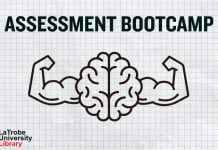This article was written by our Semester 2, 2024 social media intern, Imtinan.
Have you ever been terribly busy doing life, only to realise that you have left your assessments until the last minute? This has happened to me more times than I can count!
As a La Trobe student and social media intern who is an executive member in the Prosthetics and Orthotics Student Society (POSS) and a member of the congress and editorial committees of the Australian Orthotic Prosthetic Association (AOPA), managing between these various aspects of my life can be a challenge, especially when the assessment period rolls in.
So, here are a few tips that I follow in different situations to stay on track and utilise my time wisely!
When you don’t know where to start:
- Use the Two-minute Rule – If a task takes less than two minutes to complete do it immediately! This helps prevent small tasks from piling up and becoming overwhelming.
- Prioritise Tasks – Start by identifying your top three priorities for that day. Focus on completing these tasks before moving on to others. This ensures that you tackle the most critical work first, helping you stay on track with your goals.
When starting an assessment:
- Understand the Topic – Read the requirements of the assessment, so that you can separate what you already know from what you still need to know and form them into questions. Then, seek further assistance from your lecturers to clarify those questions. They are always there to help!
- Break Tasks into Smaller Steps – Assessments can be overwhelming. Thus, break them down into smaller, manageable tasks. This approach, known as chunking, makes it easier to start and track your progress. For example, if you have an essay due, divide it into tasks like researching, outlining, writing, and editing.
When working on an assessment:
- Create a Detailed Plan – List all the tasks that you specified, from the research stage to the final edit. Allocate specific time slots for each task in a digital planner such as Google Calendar or to-do list, which send you reminders that help you stay on track.
- Balance Work and Rest – Incorporate regular breaks into your study sessions to avoid burnout. Techniques like the Pomodoro Technique—working for 25 minutes followed by a 5-minute break—can enhance focus and efficiency. Do not forget to reward yourself for your hard work!
When working through your weekly content:
- Focus on reading the required texts – most often, subjects have many listed readings that are not all required. Those are labelled as recommended and are provided for additional knowledge. They are certainly helpful, but sometimes it is more efficient to read the specified pages of your required texts first.
- Limit Distractions – choose a quiet study space and use the ‘Do Not Disturb’ feature on your phone to increase your focus—or just keep your phone in a separate space altogether!















